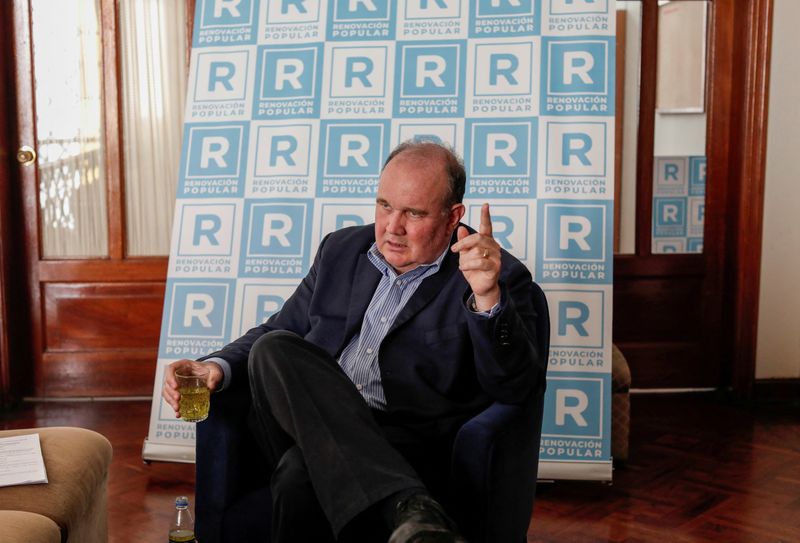Peru conservative Opus Dei businessman elected mayor of Lima
2022.10.03 17:46
[ad_1]

© Reuters. FILE PHOTO: Conservative Opus Dei businessman Rafael Lopez Aliaga talking to Reuters in Lima, Peru on March 12, 2021. REUTERS/Angela Ponce/File Photo
LIMA (Reuters) -Conservative businessman Rafael Lopez Aliaga won a closely contested election to become mayor of Peru’s capital Lima on Monday after his rival, retired military officer Daniel Urresti, accepted his defeat.
In his first public statements since Sunday’s election, Lopez Aliaga said he would wait for the final official results before asking his rivals to work together, and calling for leftist President Pedro Castillo to step down amid an investigation of alleged corruption against him.
“I would ask Castillo to resign, for the good of Peru,” said Lopez Aliaga, a hotel businessman.
With 97.6% of ballots counted, Lopez Aliaga led with 26.287% of votes, the National Office of Electoral Processes (ONPE) said on its website.
His closest rival, retired military officer Daniel Urresti, who is on trial for allegedly participating in the murder of a media worker in 1988, was just behind with 25.379% of the votes.
The difference between the two candidates sits at about 47,400 votes.
Lopez Aliaga heads the conservative Popular Renovation party and is a staunch opponent of Castillo. The conservative politician ran for the presidency in 2021 and came third in those elections.
The conservative businessman considers himself a “pro-life” politician and is also known for his attacks on the gay community and for being against abortion and gender ideology.
Lopez Aliaga’s victory in Lima, where a third of the country’s voters are concentrated, as well as likely victories by independents in regional votes in Peru’s interior departments, is a harsh defeat for the Marxist Peru Libre party that helped propel Castillo to the presidency.
Lima, with 10.5 million inhabitants, faces significant challenges in citizen insecurity as well as poverty on the city’s outskirts and a dearth of health and education services.
In addition to the mayor’s office for Lima, Peruvians elected some 13,000 local authorities, including governors of the country’s 25 regions. It was not yet clear on Monday who would be the winners in the main mining regions, which register record income from taxes and royalties.
Peru is the world’s second largest producer of .
[ad_2]
Source link








